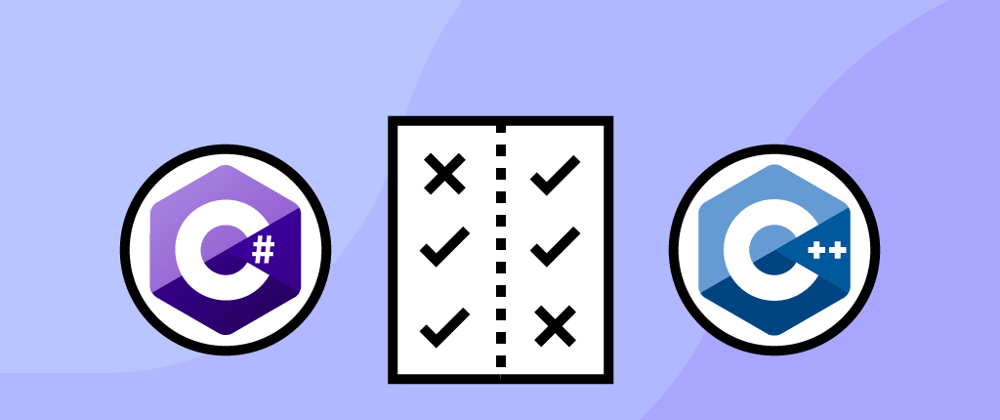C# and C++ are general-purpose programming languages used for application development across various platforms. C# and C++ have rich histories. They’re both popular choices for software development, web development, and game development. If you’re new to computer science, it may be difficult to choose which language to learn first.
In this article, we’ll discuss the difference between C# and C++, as well as their histories and applications.
We’ll cover:
- C# vs C++: A brief history
- Overview and applications: C# vs C++
- Major differences between C# and C++
- Should I learn C# or C++?
- Wrapping up and next steps
C# vs C++: A brief history
Both C# and C++ are based on the C programming language. C is a low-level programming language that was developed in the 1970s for programming in the UNIX operating system. C has various applications to this day, including embedded systems and scripting processes for server-side web applications. Other C-based languages include Objective C and Not Quite C.
When was C# created?
C# (pronounced “C Sharp”) was developed in 2000 by Microsoft’s Anders Hejlsberg. It was known as “Cool” or "C.O.O.L." in its early days, which stood for “C-Like Object Oriented Language.” C# was introduced as a generic object-oriented programming (OOP) language and a direct competitor to Java on the Windows platform. In 2005, C# version 2.0 was still in the process of catching up with Java by introducing generics and iterators. By 2007, C# was growing into a more distinct hybrid as both an object-oriented and functional language.
C# has gained many features over the years and become a multi-platform language. It was initially intended for development in the Microsoft ecosystem, but Microsoft has since released open-source tools that support C# development across various platforms: the Visual Studio Code code editor, the Roslyn compiler, and the unified .NET platform.
When was C++ created?
C++ was developed in 1979 by Bjarne Stroustrup, a Danish graduate student. Influenced by his PhD thesis, Stroustrup aimed to enhance C by incorporating features from Simula and other programming languages. C++ fulfilled the need for object-oriented programming within C. It was a general-purpose language that introduced objects and classes to C. As such, it was colloquially known as “C with Classes”. The “++” directly comes from C’s ‘++’ operator, which increments the value of a variable. C++ has since changed significantly and adopted object-oriented, generic, and functional features as well as facilities for low-level memory manipulation.
Overview and applications: C# vs C++
At first glance, C# and C++ might seem to have more similarities than differences. They’re both multi-paradigm languages that can support object-oriented, functional, and generic programming. They are general-purpose, and widely used for software development, web development, and game development across platforms. Let’s examine each language individually before we compare their differences.
What is C#?
class HelloWorld
{
static void Main()
{
System.Console.WriteLine("Hello, World!");
}
}
-> Hello, World!
C#, or C Sharp, is a high-level language that runs on the .NET Framework. It is a multi-paradigm language that includes support for structured, imperative, reflective, and concurrent programming paradigms. C# code is typically compiled using just-in-time (JIT) compilation in Common Language Runtime (CLR), the virtual machine component of the .NET Framework. The code is converted to machine instructions that are executable on the computer’s CPU.
C# was originally designed for the Microsoft platform. Today, it has a variety of development applications, including:
- Web applications
- Mobile applications for Android and iOS
- Desktop applications for Windows, Mac, and Linux
- Video games on the Unity game engine
What is C++?
#include <iostream>
using namespace std;
int main() {
cout << "Hello, World!";
return 0;
}
-> Hello,World!
C++ is considered an intermediate language, meaning it combines features of high-level and low-level programming languages. It is a multi-paradigm language that includes support for procedural, object-oriented, imperative, and generic programming paradigms. As a low-level language, it gives you a lot of control over your code. C++ is often a go-to language for large and embedded systems, and is known for its speed and flexibility. C++ is most often implemented as a compiled language, meaning the source code compiles directly into machine code.
C++ is often used for system programming and building applications with resource constraints. It is also used to develop the following:
- Desktop applications
- Operating systems
- Embedded systems
- Servers
- GUI applications like browsers
- Advanced computation projects
- Video games on the Unreal game engine
Major differences between C# and C++
Let's start with three major differences between C# and C++:
- C# and C++ are classified as different levels of languages: C# is a high-level language. C++ is an intermediate language, which means it combines features of high-level and low-level languages. As a high-level language, C# is inherently easier to learn and faster for building applications. High-level languages are user-centric, while low-level languages are machine-centric. However, high-level languages are also inherently limited because they can’t perform low-level programming. A low-level programming language offers far more flexibility with your code, which makes C++ more impressive in the category of flexibility.
- C# and C++ code run differently on machines: C++ applications can run natively. C#, on the other hand, requires a virtual machine. C++ code is very similar to machine code. Your source code is compiled and converted to machine code without the need for a virtual machine. On the contrary, you need to install the .NET framework to run a C# application.
- C# and C++ have different approaches to memory management: C# offers automatic garbage collection, but C++ doesn’t. This means that C++ requires you to manually manage what C# does automatically in a virtual machine. The plus side to manually managing your memory on C++ is that you also have opportunities to optimize your application from the ground up.
Comparison chart: C# vs C++
Should I learn C# or C++?
You can choose whether to learn C++ or C# based on your personal and professional goals. Some important factors to consider are the industry you want to work in, the amount of time you’re willing to spend learning a language, and the types of applications you want to develop.
Here are some factors to consider when choosing which programming language to learn:
- Your game development goals: C# and C++ are both used for game development. The Unreal game engine uses C++, while the Unity game engine uses C#. C++ is slightly more popular in the industry because it allows programmers more control than C#. If you’re looking to enter the gaming industry, you might want to base your decision off the language used by your favorite companies’ game engines.
- How much flexibility you want in a language: Flexibility differs between the languages. C# is easier to learn than C++, but C++ gives you more flexibility with your code as a low-level language. You can optimize and customize an application however you wish with C++. Relatively speaking, you can do anything with C++.
- The types of applications you want to develop: The applications you want to develop may also determine your choice. C# is a top pick for applications in the Microsoft ecosystem, especially for Windows desktop applications. However, C# is a cross-platform language that can build for other platforms as well. One thing C# cannot do is create embedded applications. For this kind of task, C++ should be your go-to. C++ is the top pick for programming for Linux.
- Your web development goals: C# is a popular choice if you’re looking to get into web development. You can use C# to build dynamic sites and web applications using .NET or other open-source platforms. C++ is less popular for web development for a few reasons. To start, cloud-based hosting is expensive for C++ and there are no stable and mature frameworks for C++ web development. That being said, C++ web development is possible, and comes with some benefits: more control, higher speed, relatively less resource consumption, and an understanding of how the web really works. There are certainly developers who prefer C++ for web development, especially when they have limited power and many concurrent users.
- Your desired learning curve: The learning curve you’re willing to tackle might also impact your decision. C++ usually takes longer to learn than C#. This is because C++ is a low-level language and is machine-oriented, while C# is more intuitive to users as a higher-level language. The languages you already know might shorten your learning curve for either language. For instance, C# may be easy to learn if you know Java, because they're similar languages. C++ may come easier to you if you’re familiar with the C programming language, or have a background in another high-level or low-level language.
- How well you want to understand computers: You may not prefer it for every project, but C++ is a great language to learn if you’re a computer programmer who wants a deep understanding of how computers work. C++ lets you get hands-on with low-level concepts, and will help you grasp how computers think and operate. Other languages might make more sense to you after you’ve mastered C++.
Wrapping up and next steps
C# and C++ are distinct languages that are often used for the same purposes. They are popular for web development, game development, mobile development, and software development across various platforms. They are classified as different levels of languages and their code is processed differently by machines.
Whatever you choose, there are certainly advantages for learning either language. If you have the time and the inclination, you may even decide to learn both!
- To help you master C++, we’ve created the C++ for Programmers learning path on Educative. The 5-module interactive learning path covers C++ basics, templates, OOP, concurrent programming, and more.
- To help you get hands-on with C#, we’ve created this course on Educative: C# for Programmers: A Practical Guide. The course covers fundamentals of C# programming including loops, arrays, and OOP.
Happy learning!
Continue learning about C# and C++ on Educative
- Why C++ is a good first language to learn
- The 11 best C++ IDEs (and code editors) for 2022
- Is C++ still a good language to learn for 2022?
Start a discussion
Do you prefer C++ or C#? Was this article helpful? Let us know in the comments below!










Top comments (1)
it's cool !